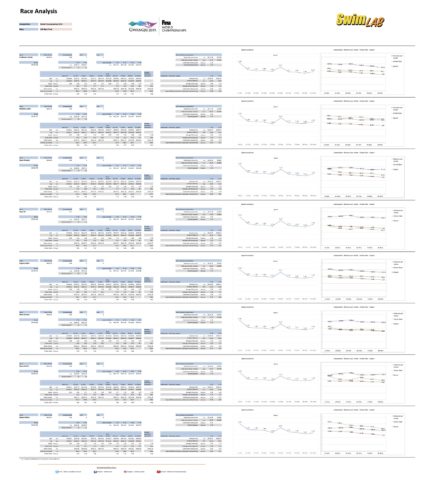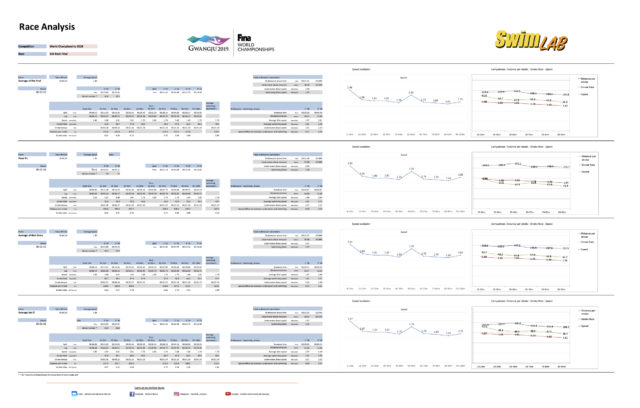In this third analysis of the 2019 World Championship final, I will review the men’s 100 backstroke.
It is time to study (but in a fun way)!
- To see a discussion of the information in these analyses, click here.
- Click here for the analysis of the final of men’s 100m free
- Here for the analysis of the final of women’s 100m free
MEN 100M BACKSTROKE – FINAL
- Guilherme Guido (BRA) – 53.26 (7th place)
- Mitch Larkin (AUS) – 52.77 (3rd place)
- Ryan Murphy (USA) – 52.78 (4th place)
- Xu Jiayu (CHN) – 52.43 (1st place)
- Evgeny Rylov (RUS) – 52.67 (2nd place)
- Matt Grevers (USA) – 52.82 (5th place)
- Ryosuke Irie (JPN) – 53.22 (6th place)
- Robert Glinta (ROU) – 54.22 (8th place)
Race Video (only highlights have been published for public use):
Every race is different, and every final analysis is different.
The analysis carried out on the men’s 100m backstroke final in South Korea shows some points in common with the men’s and women’s 100m analysis we did earlier and of course some differences as well.
AVERAGE TIME
If we start studying the average parameters of the final, we can see that the average time in the first 50m is 25.40 and the second half is 27.63 with an average time of 6.10 in the first 15m.
If we compare these parameters between the first three athletes and the last five, we can see that for the first 15m and the first 50m the differences are not so significant.
The split time at 15m is 6.13 for the first three and 6.08 for the last five.
At 50m we recorded 25.40 for the first three, same time of the average of all finalists, and 25.39 for the last five athletes.
If we compare the time of the first one at 50m (25.22) with the average of all finalists (25.40) we can see a small difference: surely lower than the difference recorded in 100m freestyle.
That means that to swim the final a 100m backstroker has to be fast in the first 50m, but only those who have a faster back end can get a medal.
TURNS
Some more considerable differences can be noted if we examine the turns.
Taking into consideration the time from 45m to 65m we can see 9.78sec for the first three athletes and 9.96sec for the last five. With a more precise analysis we can see that the time from 45m to 50m is almost the same for the first athletes and the last five, so the first 15m after the turn are faster for the first three athletes.This is the point where they start gaining advantage.
Underwater Phase
If we check the underwater phase after the start, we can see that the first three athletes keep it shorter than the last five athletes, 13.77m the first three and 14.16 last five. The first three are a bit more effective and efficient, though – the underwater phase is faster for the top swimmers at 2.54 meters per second versus 2.51 for the last five.
CONCLUSION
The main difference between the first three and the last five swimmers concerns the second 50m. 27.23 for the first three swimmers and 27.87 for the last five.
With regard to the stroke rate and distance per stroke in the second 50m, we can see that the first three athletes have a similar stroke rate and a longer distance per stroke
- 47.0 stroke rate for the first three
- 47.6 for the last five
The distance per stroke for the first three is 217.3 cm while for the last five is 211cm.
If we don’t take into consideration only the second 50m but all 100m, we can notice the same trend we have already seen for 100m freestyle men and women.
The first three athletes have a slower stroke and longer distance per stroke than the last five.
Once again, the ability to apply strength and the right power to the water makes a big difference.
This story comes courtesy of STEFANO NURRA
- Analyst of Turkish Swimming Federation
- Analyst of Energy Standard
- Owner of Swimlab



Yes, every race is different. It would be interesting, for instance, examining what Rylov swam the following day the 100 back final, leading-off Russian 400 mixed medley relay. He was 51.97, 7 tenths faster than in the 100 back final, northeless at 50m he was a bit slower (25.46 vs 25.38, but his back-half was quite a lot faster : 26.51 vs 27.29).
In the relay Rylov was capable of improving a lot his swimming parameters (stroke rate and distance per stroke).
These are amazing! Looking forward to more
Agreed. Excellent article